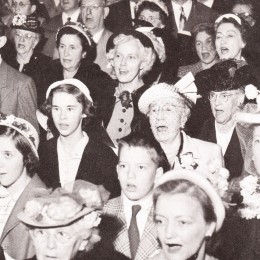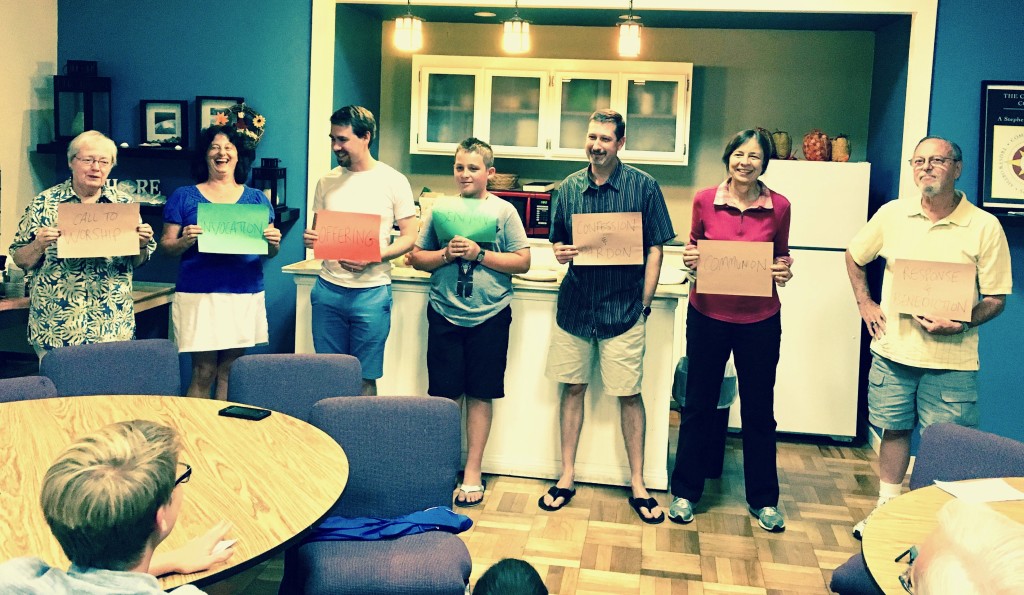WHY do we do this?

As Pastor of Worship at Grace Community Church in Seal Beach, I have the opportunity to plan our worship gatherings each week, working with a pastoral team and other creative collaborators. It’s a joy and a privilege and also a great challenge: How do we keep things fresh but also stay true to a liturgy (the “work of the people”) that helps us know God better and appropriately respond in worship? What elements need to be there each week, and which ones could we leave behind? WHY do we even do some of this stuff anyway??
Our Worship Community recently gathered to reflect on these questions, and here’s a few nuggets we discovered. This video also did a great job of prompting us to really look hard at what we do and why we do it…
Each of these liturgy elements below are activities we do fairly regularly, and the descriptions and reasons behind them are taken from The Worship Sourcebook and Desiring the Kingdom. We decided that each one, when done properly, helps us worship God in spirit and truth, and that they really do matter after all:
Call to Worship “An invitation to be human”
One function of the invitation is to express welcome and hospitality. We worship in the joyful context of our renewed relationship with God in Christ. These words may be spoken with a gesture of open embrace and a genuine smile to convey the warmth of God’s love.
Another function of the invitation is to call the community to the unique activity of worship. The primary activity of the worship service is for worshipers to participate in the gift exchange of worship itself, by hearing God’s Word, by offering prayers and praise, and by receiving spiritual nourishment offered at the Lord’s table. The call to worship establishes the unique purpose of the worship service and reinforces the “vertical dimension” of worship—an encounter between God and the gathered congregation.
Invocation “Utter dependence on God”
These petitions express longing for God as well as deep dependence and humility. Invocations acknowledge that the power in worship is a gift from God rather than a human accomplishment, and they explicitly confess that we approach God only through Christ.
The term invocation implies that the congregation invokes, or “calls upon,” God, but it should never be inferred that we are the ones to invite God into our presence, or that God’s presence with us depends on our invoking the Lord. God is present before we begin! Our prayers of invocation celebrate and acknowledge God’s presence; they don’t produce it.
Confession and Assurance of Pardon “Brokenness, Grace, Hope”
Our God longs for honesty and holiness within the promise-based relationship God has established with us in Christ. In a culture that avoids talk of sin and culpability, regular prayers of confession foster honesty and openness in our relationship with God. Just as a marriage cannot flourish without honest confession, so our mar- riage-like relationship with God cannot flourish unless we freely and honestly express all facets of our life: hopes, fears, sins, desires, thanksgiving, and praise.
The call to confession invites us to honest expression within the context of our covenant relationship with God. God’s grace comes to us, creating a relationship with us in Christ in which honesty about our sin is welcome and safe. We confess our sin not in order for God to forgive us but because God has forgiven us in Christ. The call to confession, therefore, is a word of grace like the assurance of pardon, not an exercise that shames us into confession.
Offering “Kingdom economics of gratitude”
The offering is a vital part of our response to God and God’s Word. It helps us connect our adoration for God with our life of discipleship. The money given at the offering is a token and symbol of our desire to devote our whole selves to God’s service in response to God’s loving faithfulness to us. It is symbolic of the many other gifts we should return to the Lord: time, possessions, talents, insights, and concern for others.
The word offering implies something freely given, something presented as a token of dedication or devotion. Everything we have is a gift from God, and our offerings are a way of acknowledging God as the giver. Take care not to refer to this act of worship as the “collection,” which can imply that it is gathering money to defray expenses. Quite the contrary—the purpose of the offering is to offer our firstfruits to God, to render to God a sacrifice of praise.
Sermon “Renarrating the World”
The reading and preaching of God’s Word stands at the center of worship and constitutes one of the privileged moments of worship. The words that introduce and respond to the reading and preaching of Scripture are important for helping the congregation to receive them both attentively and gratefully.
The Scriptures function as the script of the worshiping community, the story that narrates the identity of the people of God, the constitution of this baptismal city, and the fuel of the Christian imagination.
Communion “Supper with the King”
The Lord’s Supper is a physical, ritual action, mandated by Jesus, through which God acts to nourish, sustain, comfort, challenge, teach, and assure us. A richly symbolic act, the celebration of the Lord’s Supper nourishes our faith and stirs our imaginations to perceive the work of God and the contours of the gospel more clearly.
As the New Testament unfolds the meaning of the feast, it describes the Lord’s Supper as a single celebration that conveys several layers of meaning. First, the Lord’s Supper is a celebration of memory and hope. We remember all that God has done for us, especially in Christ. The Lord’s Supper is a thankful remembrance of the entire life and ministry of Christ: his participation in the creation of the world; his birth at Bethlehem; his teaching and miracles; his suffering, death, resurrection, and ascension; his sending of the Spirit; and his second coming and final reign. Significantly we remember not only the actual events (past and future), but especially how those events give us an identity, how they transform us and all creation.
Response & Benediction “The cultural mandate meets the great commission”
The close of a worship service depends a great deal on the theme and development of the particular service. Some services end in celebration, others in quiet contemplation. Some end in a confident call to discipleship, others in a quiet prayer for God’s comfort. It is important to give a congregation time to process in prayer and consider the unique way in which the Holy Spirit is speaking to them through the service.
The greeting from God at the beginning of a service and God’s blessing at the end of the service frame the entire worship liturgy. Just as we begin with God’s gracious invitation, so we end with God’s promise to always be with us. In the benediction the dialogue of worship shifts from the people’s response to God’s parting words. The words of benediction (a Latin word meaning “to speak well” or “to speak a good word”) are intended to bring a blessing.
Song “Hymning the language of the Kingdom”
Singing is a full-bodied action that activates the whole person – or at least more of the whole person than is affected by merely sitting and passively listening, or even reading and reciting texts. Singing is a mode of expression that seems to reside in our imagination more than other forms of discourse. Music gets “in” us in ways that other forms of discourse rarely do. A song gets absorbed into our imagination in a way that mere texts rarely do.
It was interesting to consider how the activity of singing and music itself doesn’t dictate our liturgy, or the order of it, but instead serves to enhance each of these important practices. Music serves the liturgy, the liturgy shouldn’t serve the music. Even though it’s so close to all of our hearts, we discussed music last for this very reason.
We even had group leaders line up, holding signs to designate their representative liturgical element, and we spent some time putting them in creative orders. Does it matter how these are put together? We realized that it truly does, and had a bit of fun with it, too!
 It is truly miraculous how music plays a big part in our lives, how a song can get “into us” in the deepest of ways. Two members of our community shared examples of songs that have moved them profoundly, and since they come from very different spectrums, I thought it’d be educational and inspiring to link them here. Listen to them both and appreciate with us the diversity and creativity of God’s people!
It is truly miraculous how music plays a big part in our lives, how a song can get “into us” in the deepest of ways. Two members of our community shared examples of songs that have moved them profoundly, and since they come from very different spectrums, I thought it’d be educational and inspiring to link them here. Listen to them both and appreciate with us the diversity and creativity of God’s people!




